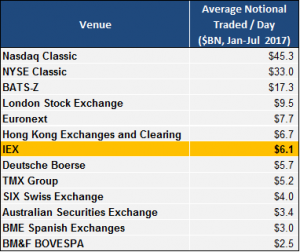I imagine myself racing against Usain Bolt in a 100-meter race after watching him win in the 2016 Rio Olympics. The sad news is, Usain Bolt will probably win 100% of the time. When I check the financial news describing the recent quote of Nasdaq, a similar race is happening in the stock market with millions of traders participating, with the majority losing their race getting their trade orders to the stock exchange when racing against the accounts of Big Bank traders. The magic behind this phenomenon is called High Frequency Trading (HFT), a concept that some trades get to the stock exchanges faster than majority of trades because of wiring the right route to the stock exchange servers. The proliferation of HFT is causing investors billions of dollars every year, and raises the ethical issues of unfairness and government intervention.
I hate it when during a classroom discussion, I finally write down an idea and is about to talk about it when a fellow peer peeks at my paper and blurts out the idea to the whole class. HTF method “electronic front-running”, parallels this situation, the Big Bank traders can see what stocks their clients want to buy, and rush in.
Why can’t the government stop these unethical practices that these Big bank traders are initiating? The answer no lies in dark pools, “private exchanges created by banks that did not have to report real time what trading activities took place within them”.
Referring to the class discussion, it is also hard to justify government intervention into the free market with only a niche group of people earning these profits.
To eradicate the unethical practices of HTF, Brad Katsuyama, a former RBC trader, created the Investor’s Exchange (IEX) that is both profitable and fair. He provides a platform for all traders to trade at equal speed, at a commission price of nine-one hundredth of a cent per share. Brad making money off the commission from IEX helps himself, but also the fairness of Wall Street; contributing to the idea “collectivist ends can be attained without collectivist means”.
Many big banks also start to use IEX. This is an example of these firms respecting the stakeholder theory. The stakeholder theory is the idea that the different groups affiliated with a business is important to the contribution of overall success of the business. While utilising dark pools will bring profits to the industry, the blame it gets from the community in a financial crisis will far outweigh the benefits.
Statistics from IEX shows from January to July 2017, it has generated an average of $6.1 billion trades a day; proving fairness and good ethics can turn into profit.

Word Count:
447
Sources:
Word:
Lewis, M. (2014). The Wolf Hunters of Wall Street Web. Retrieved from
https://www.nytimes.com/2014/04/06/magazine/flash-boys-michael-lewis.html
The Economist Group Limited (2016). Speed bumps in the night. Retrieved from
Friedman M. (2007). The Social Responsibility of Business Is to Increase Its profits. In: Zimmerli W.C., Holzinger M., Richter K. (eds). Corporate Ethics and Corporate Governance (pp 173-178) Springer, Berlin, Heidelberg.
Pictures: